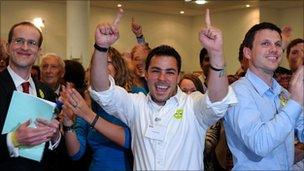AV referendum: Dividing the spoils of a bitter war
- Published
- comments

No to AV campaigners have plenty to celebrate after winning a resounding victory
A debate that was often about the complexity of electoral systems ended in the simplest of results.
The No campaign won, overwhelmingly.
The rush to attribute blame, or grab the credit for that result, begins here.
Many Lib Dems will attribute the outcome to David Cameron who they say campaigned hard for a No vote despite agreeing not to take a leading role.
As early as February the prime minister had no qualms about reminding people Nick Clegg had once called the alternative vote a "miserable little compromise".
Relations between the coalition partners deteriorated from there, until Energy Secretary Chris Huhne confronted the prime minister in cabinet in what became a very well publicised spat.
Both Mr Huhne and the former Lib Dem leader Lord Ashdown accused the No campaign of personally targeting Nick Clegg and telling lies, something which was denied.
While some suspected the tension was carefully staged to boost Lib Dem election hopes, Mr Huhne insisted, as the results came in, relationships had grown frayed.
These moments of melodrama won the attention of journalists.
Unusual alliances
Gripping the wider public, would prove to be more difficult.
In the event much of debate was characterised by two things that tend to bore voters - bickering politicians and ferocious, sometimes obscure, battles between political campaigners.
Even committed Westminster watchers may soon struggle to recall the details of a row about a poster featuring a soldier's body armour, or the intricacies of the campaign donations.
There were moments of novelty when political opponents shared one stage.
Lib Dem Business Secretary Vince Cable and Labour leader Ed Miliband appeared together at a press conference arguing for a Yes vote. David Cameron and the former Labour home secretary Lord Reid stood side by side to make the case for a no vote.
But even these unusual alliances were unlikely to win too much attention from those not naturally drawn to politics.
Turnout
All this was played out against a backdrop of huge news stories such as the Japanese earthquake and tsunami, the death of Osama bin Laden and the royal wedding.
Despite all this, millions of people voted and even in areas where no other elections were taking place, like London, the turnout was comparable to that seen at local elections.
Those who favoured the Yes campaign will argue they were defeated by the prime minister's campaigning power, a largely hostile press and a tough opposing campaign.
They will also wonder whether people who voted against the Lib Dems in the elections might have been keen to oppose Nick Clegg's favoured electoral system at the referendum.
Those who backed a No vote will say they won the argument for the merits of the status quo, and persuaded people the alternative vote was complex and unnecessary.
The voters, of course, needed only to mark crosses on ballot papers. They did not have to explain their reasoning.
So campaigners who devoted months of their lives to this argument will never know what difference, if any, they made to the result.
- Published20 March 2012
- Published4 May 2011